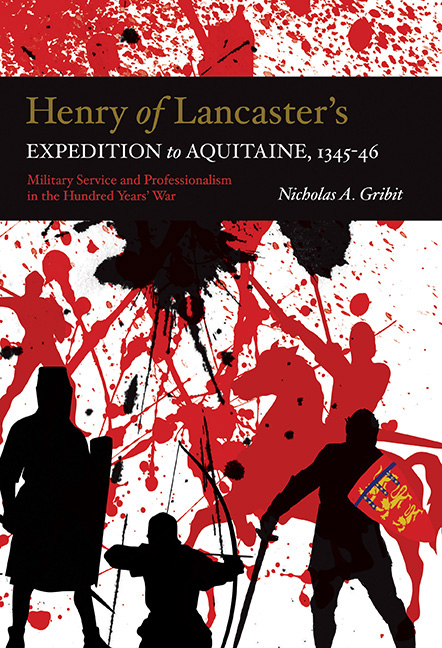 Henry of Lancaster's Expedition to Aquitaine, 1345-1346
Henry of Lancaster's Expedition to Aquitaine, 1345-1346 Book contents
- Frontmatter
- Dedication
- Contents
- List of Illustrations
- Preface and Acknowledgements
- Abbreviations
- Note on Money and Names
- Introduction
- Part I Henry of Lancaster and the English Army: Soldiers, Payment and Recruitment
- 1 Henry of Lancaster and the English Expedition to Aquitaine, 1345–46
- 2 English and Welsh Soldiers: Troop Types in Lancaster's Army
- 3 Raising an Army: Recruitment and Composition
- 4 Paying an Army: Financial Administration
- Part II The English Expedition to Aquitaine, 1345–46
- Part III Military Service and the Earl's Retinue for War
- Conclusion
- Appendix A Transcription and Translation of Lancaster's Indenture
- Appendix B Prosopographical Catalogue of Men in Lancaster's War Retinue, 1345–46
- Bibliography
- Index
- Warfare in History
2 - English and Welsh Soldiers: Troop Types in Lancaster's Army
from Part I - Henry of Lancaster and the English Army: Soldiers, Payment and Recruitment
Published online by Cambridge University Press: 05 July 2016
- Frontmatter
- Dedication
- Contents
- List of Illustrations
- Preface and Acknowledgements
- Abbreviations
- Note on Money and Names
- Introduction
- Part I Henry of Lancaster and the English Army: Soldiers, Payment and Recruitment
- 1 Henry of Lancaster and the English Expedition to Aquitaine, 1345–46
- 2 English and Welsh Soldiers: Troop Types in Lancaster's Army
- 3 Raising an Army: Recruitment and Composition
- 4 Paying an Army: Financial Administration
- Part II The English Expedition to Aquitaine, 1345–46
- Part III Military Service and the Earl's Retinue for War
- Conclusion
- Appendix A Transcription and Translation of Lancaster's Indenture
- Appendix B Prosopographical Catalogue of Men in Lancaster's War Retinue, 1345–46
- Bibliography
- Index
- Warfare in History
Summary
On Sunday 13 March 1345 the king entered into an indenture, or formal contract of service, with Henry of Lancaster, whereby Henry agreed to go to Aquitaine as the king's lieutenant and command an army of 2000 men who were to assemble at Southampton on 14 May, ready to embark for the duchy. The bulk of the cost of the expedition was to be financed by the accumulated clerical and lay subsidies, forms of extraordinary direct taxation granted to the king by parliament two years earlier. The indenture stipulated that the army was to comprise 500 men-at-arms, 500 Welsh infantry and 1000 archers (half mounted, half on foot). It also set out, amongst other things, the extensive military and judicial powers that Lancaster was to have as the king's lieutenant, and stated that he was to serve in the duchy for an initial period of six months. The terms embodied in the indenture of service are discussed in greater detail in the next chapter, but, first, an important prerequisite to an in-depth study of Lancaster's army is an examination of the typical soldiers who were required to serve under the earl's command. Although the various troop types which constituted English armies in the fourteenth century have been discussed extensively in previous studies, there remains some ambiguity surrounding the terminology used both by contemporary clerks and present-day scholars to describe men of different rank and status. A brief definition of each type of soldier that served with Lancaster is therefore needed. It is necessary to determine how they were equipped, to analyse the various terms used by clerks to describe such men and where they fitted in the overall structure of the army, and how they related to medieval society in general.
The conventional view that medieval armies were made up of ‘cavalry’ and ‘infantry’ contingents does not fit with the English armies of the fourteenth century. As Michael Prestwich points out, it would be problematic to define a soldier by whether he fought on horseback or on foot, not least because the developments in army organisation in Edward III's reign had transformed the military role, and sometimes the status, of the medieval soldier.
- Type
- Chapter
- Information
- Henry of Lancaster's Expedition to Aquitaine, 1345-1346Military Service and Professionalism in the Hundred Years War, pp. 23 - 34Publisher: Boydell & BrewerPrint publication year: 2016
